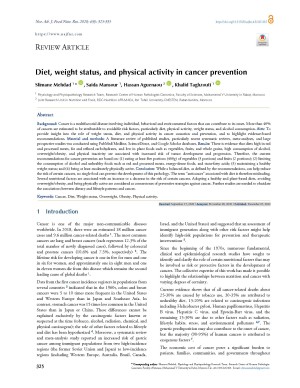Diet, weight status, and physical activity in cancer prevention
Abstract
Background: Cancer is a multifactorial disease involving individual, behavioral and environmental factors that can contribute to its onset. More than 40% of cancers are estimated to be attributable to avoidable risk factors, particularly diet, physical activity, weight status, and alcohol consumption. Aim: To provide insight into the role of weight status, diet, and physical activity in cancer causation and prevention, and to highlight evidence-based recommendations. Material and methods: A literature review of published studies, particularly recent systematic reviews, meta-analyses, and large prospective studies was conducted using PubMed/Medline, ScienceDirect, and Google Scholar databases. Results: There is evidence that diets high in red and processed meats, fat and refined carbohydrates, and low in plant foods such as vegetables, fruits, and whole grains, high consumption of alcohol, overweight/obesity, and physical inactivity are associated with increased risk of tumor development and progression. Therefore, the current recommendations for cancer prevention are based on: (1) eating at least five portions (400g) of vegetables (3 portions) and fruits (2 portions); (2) limiting the consumption of alcohol and unhealthy foods such as red and processed meats, energy-dense foods, and trans-fatty acids; (3) maintaining a healthy weight status; and (4) being at least moderately physically active. Conclusion: While a balanced diet, as defined by the recommendations, can help reduce the risk of certain cancers, no single food can prevent the development of this pathology. The term "anticancer" associated with diet is therefore misleading. Several nutritional factors are associated with an increase or a decrease in the risk of certain cancers. Adopting a healthy and plant-based diets, avoiding overweight/obesity, and being physically active are considered as cornerstones of preventive strategies against cancer. Further studies are needed to elucidate the associations between dietary and lifestyle patterns and cancer.
Full text article
Authors
Copyright (c) 2020 Authors

This work is licensed under a Creative Commons Attribution 4.0 International License.
-
Attribution — You must give appropriate credit, provide a link to the license, and indicate if changes were made. You may do so in any reasonable manner, but not in any way that suggests the licensor endorses you or your use.
-
No additional restrictions — You may not apply legal terms or technological measures that legally restrict others from doing anything the license permits.





